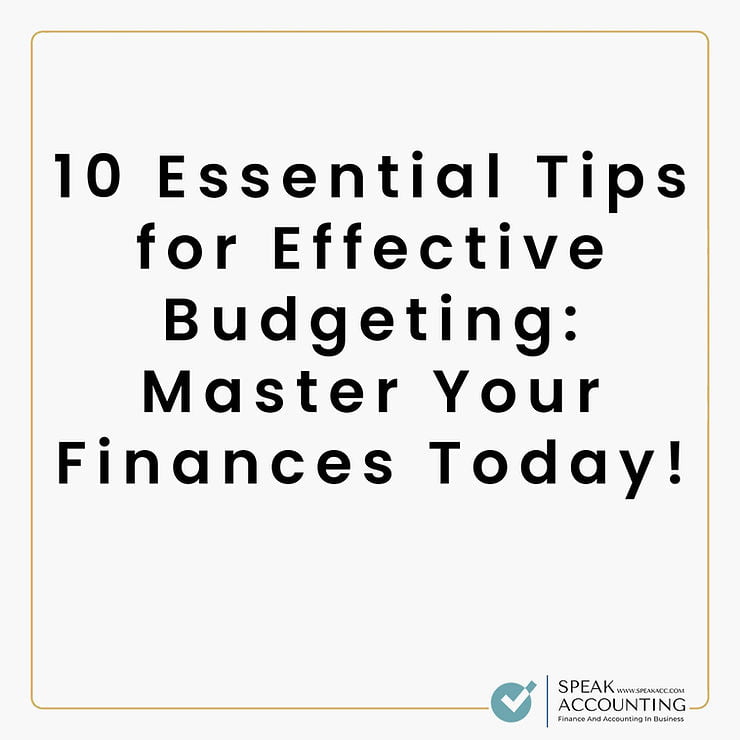10 Essential Tips for Effective Budgeting: Master Your Finances Today!
Introduction:
Are you tired of living paycheck to paycheck or feeling overwhelmed by financial stress? The key to financial freedom lies in effective budgeting. By taking control of your income and expenses, you can pave the way to a secure and prosperous future. In this blog post, we will share ten essential tips for effective budgeting that will empower you to make the most of your money. Let’s dive in!
Post Content:
6- Use Envelopes or Budgeting Apps
7- Plan for Irregular Expenses
8- Review and Adjust Regularly
10- Stay Committed and Celebrate Milestones:
1- Set Clear Financial Goals:
To create an effective budget, you need to establish clear financial goals. Ask yourself what you want to achieve in the short-term and long-term. Whether it’s paying off debt, saving for a down payment on a house, or planning for retirement, having specific goals will give your budget a purpose and motivate you to stick to it.
2- Track Your Expenses:
Understanding where your money goes is crucial for successful budgeting. Start by tracking your expenses for a month, categorizing them into essential and non-essential items. This exercise will help you identify areas where you can cut back and make necessary adjustments to align your spending with your financial goals.
3- Create a Realistic Budget:
Based on your financial goals and expense tracking, create a realistic budget that factors in all your income and expenses. Be honest with yourself and avoid underestimating expenses or overestimating income. Remember, a budget should be flexible enough to accommodate unexpected costs while still helping you meet your financial objectives.
4- Prioritize Savings:
Saving money is a fundamental aspect of budgeting. Make it a priority to set aside a portion of your income for savings each month. Aim to build an emergency fund that covers at least three to six months’ worth of living expenses. Additionally, allocate a percentage of your income towards long-term savings for retirement or other significant goals.
5- Cut Unnecessary Expenses:
To make your budget more effective, identify and eliminate unnecessary expenses. Review your spending habits and identify areas where you can make cutbacks without sacrificing your quality of life. This could involve canceling unused subscriptions, reducing dining out, or finding cheaper alternatives for certain products or services.
6- Use Envelopes or Budgeting Apps:
Consider using envelopes or budgeting apps to help you manage your finances effectively. Envelopes allow you to allocate cash for specific expenses, helping you visually track your spending. Alternatively, budgeting apps provide digital tools to categorize and track expenses, set financial goals, and receive notifications to keep you on track.
7- Plan for Irregular Expenses:
Many expenses occur irregularly throughout the year, such as insurance premiums, annual subscriptions, or holiday expenses. Account for these costs by setting aside a small amount each month into a separate savings account. This proactive approach ensures you won’t be caught off guard when these expenses arise.
Also Check:
How Can We Make Accounting Cool
Do you need a degree to be an accountant?
Behind the Books: Delving into Errors in Accounting
8- Review and Adjust Regularly:
Budgeting is an ongoing process, not a one-time task. Review your budget regularly to see if it aligns with your financial goals and adjust as necessary. Life circumstances change, and your budget should adapt accordingly. Stay proactive and make tweaks when needed to keep your budget effective and relevant.
9- Seek Professional Advice:
If you’re struggling with budgeting or have complex financial situations, consider seeking advice from a financial professional. They can provide guidance, offer personalized strategies, and help you navigate any challenges or roadblocks you may encounter.
10- Stay Committed and Celebrate Milestones:
Effective budgeting requires discipline and commitment. Stay focused on your financial goals, even when the going gets tough. Celebrate small milestones along the way to keep yourself motivated and reinforce positive financial habits.
Conclusion:
Effective budgeting is a vital skill that can transform your financial situation and provide peace of mind. By implementing these ten essential tips, you’ll be well on your way to mastering your finances. Remember, it takes time and effort to develop healthy financial habits, but the rewards are well worth it. Start today and pave the way to a brighter financial future!
Read More
- The Impact of Artificial Intelligence on Accounting and Finance: Revolutionizing the Future
- 10 Essential Tax Deductions for Small Businesses: Maximizing Your Savings
- The Relationship Between Chat GPT and Accounting
- How Many Bank Accounts Should a Small Business Have?
- Why is Personal Finance Dependent Upon Your Behavior?
Share this content:













Post Comment
You must be logged in to post a comment.